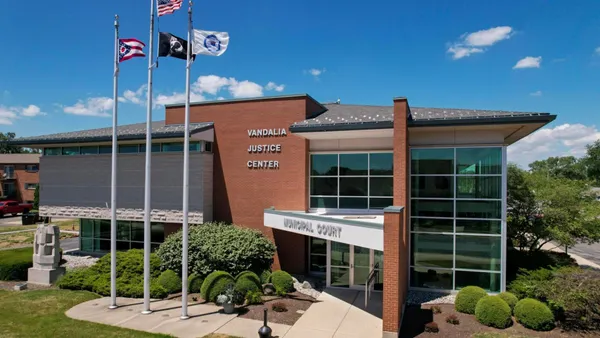While Paris is known to some as the City of Lights, it's known to others — particularly government leaders — as a city of digital transformation thanks to Nejia Lanouar's leadership.
Since 2012, Lanouar has served as the city's chief information officer, helping to implement a digital-first approach to government operations and civic engagement. One of Lanouar's biggest projects has been the development of Lutece, a modular open-source platform that powers more than 200 digital city services in Paris. Lutece has helped the Parisian government streamline and manage various operating systems, leading to cost-savings and increased communication with residents.
Lutece's impact on the city has been so great that Lanouar is now focusing on how other city governments can adopt the structure. Bloomberg Associates has assisted Paris in building out the Lutece platform and sharing it on a larger scale, promoting its benefits to cities around the world.
"Our major role has been making the connection between cities," said Todd Asher, a deputy principal at Bloomberg Associates. Asher noted that the only other city to begin utilizing Lutece is Lyon, France. However, there is interest from a number of U.S. cities to adopt the platform.
"Lutece is really a wide-ranging platform. The fact that it’s free is one thing, but the fact that it’s tested from a security standpoint and [knowing] it's actually going to be useful is hugely appealing," he said.
Smart Cities Dive caught up with Lanouar to gather insights on the way Lutece has powered Paris, on residents' reaction to a digital government and on the future of female leadership in tech.
The following interview has been edited for clarity and brevity.
SMART CITIES DIVE: How has Lutece helped to bridge communication between city departments in Paris?
NEJIA LANOUAR: It's very important to think about the end-to-end connection between the user and the back office services and also the external companies which work for Paris. For example, the City of Paris has a contract with a company which cleans the graffiti on the walls. The Parisians don't like graffiti. So they report the issue in the Lutece application Dans Ma Rue ("In my Street"), and the report is automatically sent to the application of the company in charge of the cleaning. The end-to-end communication is very important because if you offer only the front service, it’s just a form. The residents can always send a form, but after, what happens?
Has this lead to cost-savings?
LANOUAR: It has. First, by sharing insight. Not only with other cities but, before Lutece, the departments developed their own tools. Now, when we have a need in a department — for example, to develop an appointment application — it’s the same one for all of the departments. If it's for vaccination appointments, social housing, everything is on Lutece appointment.
Whenever we have a new need, we reuse a component of Lutece and a module of Lutece, and we write the white page from scratch to develop a completely new solution. Internally it's very important to reuse modules and to have a vision of all the needs. When the different departments ask us for new applications ... the first thing we do is check if we have modules which already propose a solution. If it's possible, okay, if not we try to reuse and develop something not too [far-off], so it’s very cost-effective.
When you have hundreds and hundreds of applications, it's a very [significant expense] ... We don’t have the means to [create them all by scratch]. If we didn't have the platform Lutece, we probably couldn't offer so many digital services to the residents and the Parisians.
Have residents been receptive to this digital evolution?
LANOUAR: It's very important for them to have digital services but they're not always happy. And you know when they're not happy. But it's easier for them now to register their children at school, to reserve a tennis court, to register for social housing. Now they can do everything at home.
Especially for all of the parents, they probably do their demands after work, not during [service business hours] so they can do it [through Lutece] after dinner or on the weekend and it's open. In the past, they'd have to take a day off to go to City Hall. Now they can also report all issues and solicitations.
We now have a very closed link with our residents. They can have an account and they can have their dashboard on their personal space. We guarantee the privacy of their data. We respect their GDPR but we also have our own data center internally and of course the GDPR is very strict and we can certify that their data is not given out or sold … In France, in Europe, it's very important because people are very concerned with these issues. Paris has an open-source strategy … I think the people who are concerned by digital technologies know that Paris has a very strong policy for open-source.
I find it admirable that there’s a lot of female leadership in Paris. How has Mayor Hidalgo's leadership influenced your work, and how are you encouraging other women to get involved in the tech space?
LANOUAR: I think that [women] have another perspective, of course … An important part of my time is to manage the teams, not only to make technological choices but also to be attractive, to try to have the skills in the new technologies. We have lots of talent in France and in Europe and we are public sector. We try to have more women in our IT department, which is mostly composed of men, especially in the infrastructure department. The project department is 50/50, but the infrastructure department is 90% men. I had nominated a woman as a deputy of the chief infrastructure officer, and it's complementary … It’s a different way of thinking.
I think it's very, very efficient to have the two points of view and ways of management. It's different. We [men and women] don't manage the same. We don't discuss in the same way with big companies. I think it's very, very rich when we have two perspectives. I noted that when there's a man and a woman to manage a very technical project, the woman can help with other points of view.
For example, we had a very important project to internalize our data center and the director of the project was a woman. After, the team — all of them were men — said that it was the first time they had a woman as a project manager and it was very helpful for them because it was another way to manage the stress, to manage the difficulties.
The problem is that in the schools, they don't have enough girls who choose the digital courses. So we are depending on the schools. We have an objective in the city of Paris to be 50/50. But I don't at the moment because [I can't find the talent].










